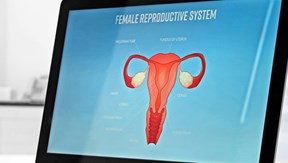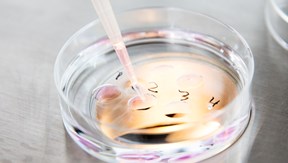Infertility
Infertility or involuntary childlessness is due to the man’s and/or the woman’s lack of ability of ensures pregnancy by regular sexual intercourse.
According to the present state of science, a couple who have actively tried in vain to become pregnant for at least a year are considered to be infertile. This is however no reason to give up hope when one becomes impatient: help to solve the problem of infertility is on hand. A little advice or help could solve the problem.

Worth Knowing about Infertility
To understand the meaning of infertility we must start out with the concept of fertility itself – i.e. The ability to have children. A girl is born with about 400.000 immature ova, ovocytes which are stored in the ovaries and the first ovum matures when the girl is about 13 years old.
The fertile period for most women lasts until they are 45 – 50 years old and a woman can become pregnant until her ovulation or menstruation stops. There is a fine balance in the hormone system which controls when an ovum is set free and also when for example during pregnancy no ova re set free.
A change takes place when a woman is about 35 years old and it will take longer for her to become pregnant. Statistics show that a woman under 35 should reckon with 3 – 4 attempts at fertility treatment (insemination) before success, whereas if she is over 35, then 6 – 8 attempts are the norm.
The fertile age for men lasts longer than that for women since the testicles can produce new sperm cells more or less throughout the man’s life. The depot of sperm cells is renewed about every 3rd month.
Fertilization
Fertilization can only take place for a relatively short period each month – in fact only for a few hours giving a probability for pregnancy of about only 25% each month. Infertility results if there is an imbalance in the production of ova and sperm cells or if physical reasons hinder the ovum and sperm cell in meeting. Infertility is unfortunately a very common condition, as 15% of all couples at the age of childbearing seek help with infertility (who).
Infertility can be relevant when a couple in their 20s have tried in vain for over a year to become pregnant. This can seem a long time to wait when a couple has decided to have a child.
Deficient Ovulation
The most common reason for infertility in the woman is lack of ovulation. The female hormonal cycle is so complex that disturbances hindering ovulation are quite common. This form of infertility can quite often be overcome by mild hormone stimulation. Infertility must however also be seen in the light of the woman’s age. Studies have shown that about a third of all women over the age of 35 were unable to become pregnant during the course of a year. Many women put off having children until they have finished their education and started on a career, but it is important to remember that after the age of 35 the chances of becoming pregnant diminish radically. A woman’s 35th year is scientifically the dividing line where after the chance of becoming pregnant is reduced.
Infertility and PCOS
Another common reason for infertility in the woman is PCOS, polycystic ovary syndrome, where the ovaries are enlarged and covered with small cysts. These are harmless but can hinder ovulation and therefore result in infertility. Scanning can show whether PCOS is present and the woman can usually become pregnant by means of IVF treatment.
Infertility and Endometriosis
Similarly endometriosis can hinder ovulation or can prevent the fertilized ovum from stabilizing itself inside the uterus. Infection or inflammation in the abdomen, following infection with Chlamydia for example can result in growths in the fallopian tubes so that the ovum and the sperm cell simply cannot meet. We therefore recommend that women who have suffered from an abdominal infection undergo an HSU (water scan) before starting fertility treatment. HSU shows whether there is a clear passage through the Fallopian tubes.
Infertility in Men
The most common cause of infertility in men is the inability to produce enough healthy sperm cells to make pregnancy possible.
Even though only one sperm cell is needed for fertilization, there must be many million cells present around the ovum, since enzymes from the sperm cells break down the protective tissue around the ovum enabling a single sperm cell to penetrate the ovum. The sperm producing tissue in the testicles is very sensitive and infection in the testicles can completely destroy the tissue.
Other causes of infertility in men can be genetic defects, traumatic damage to the testicles, or even testicles which have not dropped. Even though these last conditions can be cured by surgery, the probability of curing infertility is not very high.

19 FEBRUARY 2024

28 JULY 2023

27 JANUARY 2021

27 JANUARY 2021

27 JANUARY 2021

27 JANUARY 2021

27 JANUARY 2021

27 JANUARY 2021

27 JANUARY 2021

